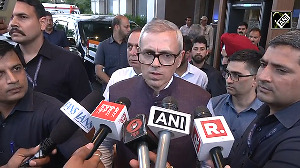If you need a textbook illustration of how secularist intervention can create discord, sometimes out of thin air, you need only look at the Uttar Pradesh government's order last Thursday to declare Friday a half-day in educational institutions of the state.
The order, modified after protests in the state assembly the next day, was a shameless act of tokenism aimed at reinforcing Muslim separateness and using the community as communal fodder. It was an act of provocation that may yet end up needlessly vitiating the atmosphere between Hindus and Muslims.
The issue is not, and never was, the right of Muslim students to offer Friday prayers. Like those Hindus who privately observe a fast on Tuesdays, most Muslims have happily used their lunch break to offer Friday namaz without that religious observance becoming an issue of State policy.
There are public holidays for special occasions such as Id, Mohurrum and, following V P Singh's grandstanding from Red Fort in 1990, the Prophet's birthday. Being a faith-driven country, India has an exemplary record of readily accommodating the religious rites and rituals of all its citizens. The right of worship has never been an issue, not even during periods of
intense communal tension.
Indeed, there was no real demand from any quarter that teachers and students enjoy an extended weekend from Friday noon. If there was any universal Muslim demand, it was that the community should have more access to modern education so as to get over its colossal economic backwardness. Muslims, as the ever loquacious Arun Jaitley put it, 'need education, more education not more holidays.'
It was a truism that was lost on Chief Minister Mulayam Singh Yadav. Now, Mulayam enjoys a reputation of being uncompromisingly secular. Translated into political terms it means that he has the ability to mobilise the support of large sections of Muslims on polling day.
In the past this support has been built on the strength of his no-holds-barred opposition to the BJP and his perceived advocacy of Muslim interests. Dating back to his image as a doughty crusader against the Ram Janambhoomi movement in 1990-91, Mulayam has even earned himself the sobriquet Maulana.
Yet this image has undeniably been eroded in recent times. The Leftists and progressives who dominate the chattering classes and exercise a disproportionate influence in the media have never forgiven Mulayam for his stubborn refusal to support Sonia Gandhi as prime minister in 1999, after Atal Bihari Vajpayee was brought down by a single vote. Their impatience with Mulayam has increased with his continuing refusal to ally with Sonia for the coming general election.
Desperate to secure the removal of Vajpayee and the NDA, it is the country's ultra-secularists who have also put out the whisper that Mulayam has entered into a secret understanding with the BJP. The intensity of the whispers has grown with Mulayam changing his political style over the years. From being regarded as the general of a lumpen army, he has become a darling of Mumbai's big business houses and has also made some inroads into the Hindu middle classes. Even on the vexed issue of Ayodhya, Mulayam has actually encouraged a process of Hindu-Muslim dialogue to resolve the issue.
For anyone who cared to notice, there was, until this controversy erupted, a marked difference between the secular politics of today's Mulayam and the secular activism practiced by him a decade ago. This didn't suit the secularist agenda. They sought to destroy the new Mulayam and chipped away at his Muslim base with a highly effective whisper campaign. A nervous chief minister chose last Thursday to send the signal that he can still be counted on to take up Muslim causes fearlessly, even when the cause itself is dubious.
Tragically, secularist politicians have always chosen the route of separatist appeasement to court the Muslim vote. Whether it is the Muslim personal laws or the bans on books by Salman Rushdie or Taslima Nasreen, secularists have always appealed to Muslims as a religious community that is somehow different from their Hindu neighbours. They have either played on Muslim fears or pandered to the most regressive sections of the community.
In return, narrow minded community leaders have ensured that on polling day the Muslim turnout is significantly higher than the rest of the population.
Either way they have encouraged the Muslim community to believe that their political clout lies in sticking steadfast to the ghettos and wearing the badge of separateness. It is one of the monumental contributions of secularist politics that Muslim self-interest has been tied, not to better roads, better living conditions and better education, but to the triple talaq, to beef, to a hatred of Israel and America, to glorification of Osama bin Laden and suicide bombers, and to holidays on Friday. A regressive agenda has been promoted to keep Muslims apart, backward and frightened.
Mulayam succumbed to this agenda because this is the only path familiar to secularists. The onus is now on the Muslim community itself to show there is an alternative to secular fundamentalism. The alternative is mushrooming local movements to pressure district magistrates into closing schools and colleges on Friday afternoons. And that, inevitably, will trigger a backlash giving secularists another opportunity to become apoplectic at the menace of Hindu communalism.







 © 2025
© 2025